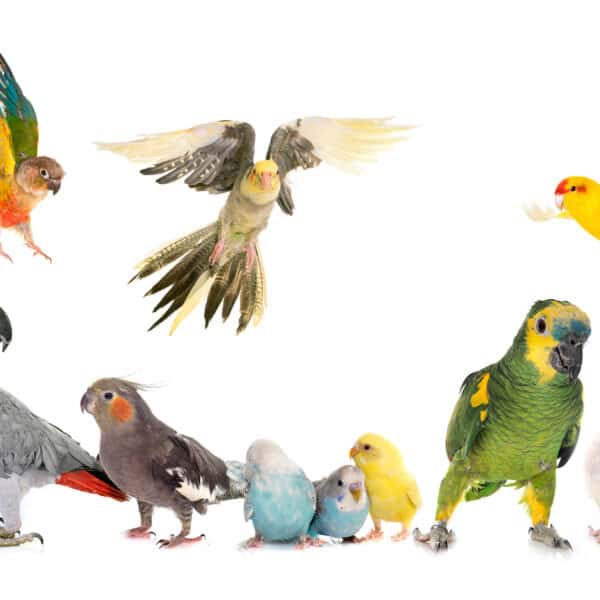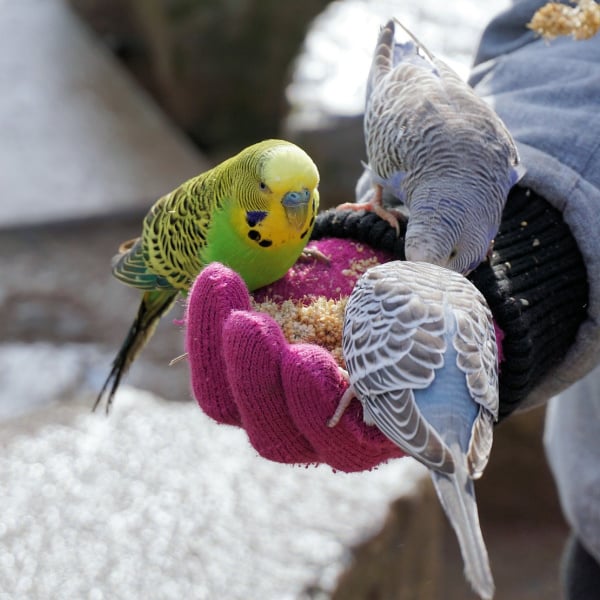Last Updated on by Catherine Tobsing
We get help desk tickets and phone calls on a regular basis seeking advice for a handicapped bird.
The most common disability is splayed foot (especially in budgies).
Splayed foot is when one or both of the bird’s feet turn sideways as a chick.
This usually happens to young birds when nesting material is “slippery” so the feet don’t have enough traction to point in the right direction while still in the nest.
The best course is to take preventative measures like providing enough nesting material. If encountered, this issue may be corrected if caught at an early age through “hobbling” and can be done with a piece of sponge.
If the problem isn’t caught early on and the birds grow into adults with splayed feet, there are many things you can do for them. Lots of products are available that will help birds with splayed legs maintain a “normal” life.
The splayed leg is not just found in small birds. Watch the video (above) with the (female) Eclectus maneuvering the top of her cage. If a splayed leg wasn’t enough of a challenge, check out another video below of the African Grey Parrot bathing with no feet
That blog post got me thinking about other bird handicaps and how bird owners cope. There are quite a few challenging problems birds can encounter, not surprising when you think about how fragile they are. They don’t weigh much. Their joints are thin and their bodies don’t have a lot of blood. Some people are natural caregivers and will take our winged companions under their own wings.
We know of birds who’ve lost their entire top beak and had them replaced with realistic-looking maxilla from medical-grade, bio-acceptable acrylic (an artificial beak). Working beaks are critical for climbing, preening, and defense.
If a prosthesis is not an option financially, we know of birds that have lost their top mandible (beak) and they end up eating by scooping pellets with their lower beak and using their tongue to climb.
I think the biggest challenge a one-winged bird has is balance. It’s best to keep them in a confined enclosure with familiar surroundings that don’t challenge their mobility.
More videos are below.
I know it’s hard to imagine a bird with one wing, but the irony is, most exotic birds today are caged birds, who rarely if ever fly. Many bird owners choose to keep their bird’s wings clipped, so life without a wing isn’t a stretch. It also really drives home the point of how much birds rely on their beaks and feet. Check out the video below of the one-winged popcorn-eating Cockatiel.
[Best_Wordpress_Gallery id=”13″ gal_title=”Handicapped birds”]
Birds have better vision than humans. Bird’s eyes have 5 types of cones, which allow them to see ultraviolet – humans have three and lack UV vision.
Editors note: Falcons use one of the extra 2 cones (sacks), yellow, to help increase contrast against a “blue” sky for better identification of fast-flying prey.
Endnote
Although rare, we’ll encounter a blind bird not to be confused with birds that eat blinds or blind people that care for sighted parrots.
The joke is intentional, it’s just one of those granular issues Google needs to work out.
Editors note: Google has gotten better at conceptually understanding questions using tools like Rankbrain.
the problem?
- A horse to a farmer is an animal.
- A horse to a carpenter is for materials support.
- A horse to a gymnast is an apparatus to perform on.
Endnote
Apparently, birds like people can get cataracts.
Some blind birds need ques, like the blind budgie in the video below.
Others much like people, maneuver from memory.
However, you choose to take in or keep a handicapped bird in your life -thank you.
If you have some thoughts or questions on this subject, please comment below
Platforms are helpful, we have a whole section for handicapped birds.
Written by Mitch Rezman
Approved by Catherine Tobsing
Author Profile
Latest entries
 Feeding Exotic BirdsDecember 29, 2025How to Switch or Convert Your Bird From Seeds to Pellets: Real-Life Case Studies and Practical Guidance
Feeding Exotic BirdsDecember 29, 2025How to Switch or Convert Your Bird From Seeds to Pellets: Real-Life Case Studies and Practical Guidance Feeding Exotic BirdsDecember 16, 2025A Practical, Budget-Smart Guide to Feeding Birds Well
Feeding Exotic BirdsDecember 16, 2025A Practical, Budget-Smart Guide to Feeding Birds Well Bird EnviornmentsDecember 7, 2025Understanding Budgie Cage Bar Orientation: Myths, Realities & Practical Solutions for Vertical-Bar Bird Cages
Bird EnviornmentsDecember 7, 2025Understanding Budgie Cage Bar Orientation: Myths, Realities & Practical Solutions for Vertical-Bar Bird Cages Feeding Exotic BirdsDecember 5, 2025How Dr. T.J. Lafeber Rewrote the Future of Pet Bird Nutrition
Feeding Exotic BirdsDecember 5, 2025How Dr. T.J. Lafeber Rewrote the Future of Pet Bird Nutrition



